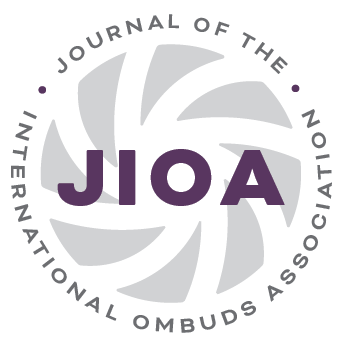The Embedded Ombuds
By Bruce MacAllister - who originally shared this article on LinkedIn
It was a pleasure to attend the most recent conference of the International Ombuds Association in Miami, Fl. It is always recharging to share ideas, reconnect with dear colleagues, and to gain a sense of awareness of current issues, challenges, and opportunities.
There were several issues that seemed to be firmly in the zeitgeist in the ombuds world. Among them were the challenges posed by the current U.S. Presidential administration’s war on learning, higher education, and its apparent perception that all universities pose a threat as bastions of liberal elitism. Ombuds working in higher education form a significant proportion of the current membership of the IOA and the cloud of potential repression of free thought and dialogue in the university context hung heavy among many.
Another issue that seems to have come into focus is an issue of how organizational ombuds services are delivered. In fact, an entire plenary session was devoted to an exercise attempting to gage the participants’ attitudes relating to whether services are provided through directly employing the ombuds within the organization, or whether ombuds services were provided though a contract mechanism by someone external to the organization. The terminology used for comparison purposes was an “embedded” ombuds versus a contract ombuds. In the session, I weighed in to explain my view that this approach introduced a false dichotomy that actually distracts from the true issue. The purpose of this post is to expand on this thought.
As a long time ombuds practitioner, I am engaged in frequent chats with other ombuds and a concern that has surfaced in these discussions is whether services provided by an external ombuds contractor can be effective. Based on these chats, it seems that the underlying concern has little to do with whether services are provided through a contract or through direct employment. Rather, the concern is whether an ombuds who is ostensibly providing services while they are remote and removed from the organization can truly provide meaningful services. So, the question is not whether the ombuds is retained via a contract but rather how deeply embedded is the ombuds providing the services.
In my work as an ombuds (now for more than 30 years), I have provided services physically on site “brick and mortar” programs, provided remote support services to programs located in entirely different states, and served via a professional services contract as the ombuds responsible for providing global ombuds support. Based on this range of experience, what I have learned is that, to be effective, an ombuds must always be embedded. As I use the term, embedded does not necessarily mean one has to be directly employed by the organization, nor does it necessarily mean that one has to work on site. What it does mean is that one must be deeply familiar with the organization they serve.
To be deeply familiar with the organization the ombuds serves requires deep knowledge of the organization, its purpose, its culture, and the panoply of other support services available to the constituents the ombuds serves. Embeddedness is part of the spectrum of ombuds competencies, not the mechanism by which the ombuds provides the services. What follows are some examples that I hope illustrate what embedded means in this context.
When I began my first ombuds role, I was selected to provide in-house, brick and mortar ombuds services to a workforce in which I had already been employed for over ten years. I had worked in system wide services as an employee relations specialist, a trainer in employment and environmental law, and a chief of staff in a major information systems function. I had deep knowledge of the organization. I was, in fact, already deeply embedded in the organization. My challenge was not that I did not know the organization, its purposes, culture, and other services. My challenge was learning all the functions and nuances of serving as its first organizational ombuds. That is, becoming competent in other aspects of serving as an organizational ombuds.
Later, I was selected by another large, elite university to come aboard (as an employee and technically a faculty member) to launch its brand new ombuds program. As an experienced ombuds I knew many things. I had learned how to launch and implement programs and knew how to work with visitors. But I was not embedded. I had to learn the physical geography of a large campus, the many other key programs and key personnel, and a whole new roster of sister services, from which I might receive referrals and to which I might make referrals. I had to meet with at least 39 other offices and their program staff. I had to socialize the ombuds concept with them, but as important if not more so, I had to learn about each of these programs. I had to meet the deans, department heads, key personnel and its governing Board of Trustees. I had to learn the hierarchy and the interplay between the various functions, staff, and personalities. To be effective, I had to work tirelessly to learn the new highly complex organization. Looking back, I was not entirely embedded or entirely effective for almost a year!
By contrast, some years later I was recruited to provide additional support for an ombuds program for a large state university because its ombuds program was faced with an overwhelming caseload. In this role, I never set foot on campus. I never met the key players. I was not directly embedded. The only way that I found I could be effective as a remote associate ombuds resource, was to be “embedded by proxy.” What this meant was that I had to work in lock step with the university ombuds who was fully embedded. I had to work with visitors and explain that I would need to explore what the available options and resources were. Granted, I slowly gained direct familiarity with the services and key players, but my role was inherently limited and inherently less efficient and effective as a result.
By sharing these examples, I do not mean to imply that an ombuds must always be physically situated within the organization. For over 13 years I served (remotely through a professional services agreement) as the ombuds for a global organization responsible for monitoring and addressing a wide range of internet abuses and problems. The members of this organization and its key players were scattered around the globe, with key functions in New Zealand, Australia, Europe, and North America. Stakeholders included virtually anyone with internet access. How could an ombuds possibly become effectively embedded? In this role, I found that to be adequately embedded required deep knowledge of the structure and function of the systems. It also required the ombuds to establish close and effective working relationships with other services that supported the overall system, such as Interpol and the FBI, and various internet watchdog groups that monitored the entire system for abuses. A key function of the ombuds was to provide feedback regarding any weak links to the safeguard systems. Over 13 years, as ombuds, I provided quarterly and annual reports that identified issues, themes and areas requiring attention. Ironically, over time with continuous feedback and improvement, the overall system – including the ombuds program – worked so effectively and reliably that the need for an ombuds to serve as a failsafe in the system became unnecessary.
Through this post, I hope I have illustrated my belief that some involved in the current dialogue are misapplying terminology. My experience has demonstrated to me, that the discussion should indeed focus on whether or not an ombuds is effectively embedded. But we need to understand that what the term refers to is not how the ombuds is retained or employed, but instead refers to how effectively the ombuds knows the organization and can effectively engage with its key functions and personnel. One can be a highly effective ombuds and provide services as a contractor if they are indeed embedded. And one who is employed in-house but does not know the organization, its culture, its key support services, and key personalities, can be entirely ineffective.
As I view it, the term embedded, as I use it, should be a factor that all ombuds must appreciate, and one which we should discuss as a professional community. There are indeed programs out there that purport to offer off-the-shelf ombuds services through a remote team of personnel who may know the fundamentals of ombuds practice, but cannot possibly provide effective ombuds services without more – embeddedness.



 In celebration of Ombuds Day 2025,
In celebration of Ombuds Day 2025,